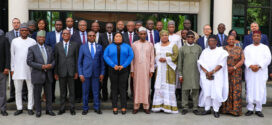During a workshop hosted by ACPC for the African Group of Negotiators on the 12-14 May 2014, participants concurred that prospects of capping temperature rise to 2 degrees above pre-industrial levels is already looking bleak, given the pace of climate change negotiations. Unfortunately, according to recent IPCC AR5 working group reports, upheavals await humanity should this projection come to pass. The IPCC AR5 working group II report posits with high confidence that food security, already a challenge to vulnerable groups in Africa, will potentially be negatively impacted by climate change, including access, utilization, and price stability.
Speaking at the African Group of Negotiators, the Ethiopian minister of Environment and Forests, His Excellency Mr. Belete Tafere cited the dire warnings by the IPCC and urged the lead negotiators in attendance to be ambitious and focused in order to press the top emitters to make binding commitments to reduce emissions. Further, the minister advised the negotiators to also prioritize mitigation as a strategy to demonstrate the continent’s contribution to a global solution. He enumerated Ethiopia’s investments in renewable energy, contemporary agricultural practices and reforestation, as initiatives geared towards achieving the country’s targets for mitigating and adapting to climate change.
In her opening remarks, Ms Fatima Denton, Director of the Special Initiatives Division of UNECA, emphasized that first and foremost, Africa has the onus to enpower the weak and vulnerable through poverty reduction programmes, for which one trajectory includes seizing opportunities existing in the interlinked sectors of agriculture, water, forestry and energy, in the context of climate change. She noted that challenges can indeed be transformed into opportunities that give choices to communities. Ms Denton affirmed ACPC’s continued readiness to address the needs of the negotiators, including playing a leading role in convening a partnership to support the group.
In his remarks during the opening session, the AGN chair, Mr Nagmeldin Goutbi Elhassan, set the tone of the meeting by zeroing in on the post 2015 agreement expected in Paris as the target for the lead negotiators. The agreement must incorporate the requirements of the Durban platform in closing the emissions gap.
One takeaway for the negotiators from the workshop recognized that bargaining on positions by parties is increasingly taking place outside the formal negotiations space, and Africa must thus be prepared to engage on these disparate platforms in order to remain in the loop. Participants were also in agreement that Africa’s ability to respond to climate change, including accessing climate funds, implementing projects and developing policies, continues to be hampered by lack of capacity. Although UNFCCC includes a capacity building programme and has records indicating activities in Africa, little change is discernible on the ground.
In conclusion, the lead negotiators requested the ACPC to craft a partnership for the use of expertise from (young) African lawyers in the negotiation process and to compile a historical narrative of Africa’s participation and decisions relevant to the continent as made by the Conference of Parties (COP) to the UNFCCC process, from Kyoto in 1997 to Paris in 2015. (UNECA)
 www.l-integration.com – L'INTEGRATION – Actualité L-integration journal actualité bénin monde afrique ligne intégration
www.l-integration.com – L'INTEGRATION – Actualité L-integration journal actualité bénin monde afrique ligne intégration





